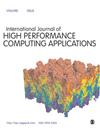使用空间和时间属性加速动态数据缩减
IF 2.5
3区 计算机科学
Q2 COMPUTER SCIENCE, HARDWARE & ARCHITECTURE
International Journal of High Performance Computing Applications
Pub Date : 2023-06-05
DOI:10.1177/10943420231180504
引用次数: 1
摘要
由于高性能计算(HPC)功能的改进,今天的许多应用程序都会产生数PB的数据,从而在系统中造成瓶颈。基于重要性的采样方法,包括我们的时空混合数据采样方法,能够解决这些瓶颈。虽然我们的混合方法已被证明优于现有方法,但其有效性在很大程度上取决于用户参数,如直方图仓、误差阈值或区域数量。此外,它所展示的吞吐量必须更高,以避免本身成为瓶颈。在本文中,我们解决了这两个问题。首先,我们评估了几个用户输入参数和细节技术的影响,以帮助确定最佳参数。接下来,我们将使用OpenMP和CUDA详细介绍并实现我们方法的加速版本。通过分析我们的实现,我们发现吞吐量提高了9.8倍到31.5倍。接下来,我们将演示我们的方法如何接受不同的基本采样算法,以及这些不同算法的效果。最后,在数据保存和数据移动方面,我们将我们的采样方法与有损压缩器cuSZ进行了比较。本文章由计算机程序翻译,如有差异,请以英文原文为准。
Accelerated dynamic data reduction using spatial and temporal properties
Due to improvements in high-performance computing (HPC) capabilities, many of today’s applications produce petabytes worth of data, causing bottlenecks within the system. Importance-based sampling methods, including our spatio-temporal hybrid data sampling method, are capable of resolving these bottlenecks. While our hybrid method has been shown to outperform existing methods, its effectiveness relies heavily on user parameters, such as histogram bins, error threshold, or number of regions. Moreover, the throughput it demonstrates must be higher to avoid becoming a bottleneck itself. In this article, we resolve both of these issues. First, we assess the effects of several user input parameters and detail techniques to help determine optimal parameters. Next, we detail and implement accelerated versions of our method using OpenMP and CUDA. Upon analyzing our implementations, we find 9.8× to 31.5× throughput improvements. Next, we demonstrate how our method can accept different base sampling algorithms and the effects these different algorithms have. Finally, we compare our sampling methods to the lossy compressor cuSZ in terms of data preservation and data movement.
求助全文
通过发布文献求助,成功后即可免费获取论文全文。
去求助
来源期刊
CiteScore
6.10
自引率
6.50%
发文量
32
审稿时长
>12 weeks
期刊介绍:
With ever increasing pressure for health services in all countries to meet rising demands, improve their quality and efficiency, and to be more accountable; the need for rigorous research and policy analysis has never been greater. The Journal of Health Services Research & Policy presents the latest scientific research, insightful overviews and reflections on underlying issues, and innovative, thought provoking contributions from leading academics and policy-makers. It provides ideas and hope for solving dilemmas that confront all countries.

 求助内容:
求助内容: 应助结果提醒方式:
应助结果提醒方式:


